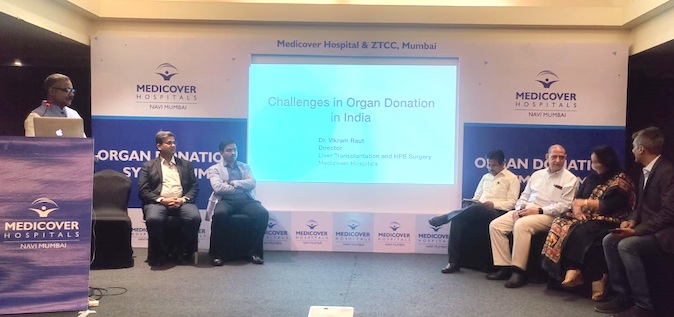General
Organ Donation Symposium Conducted By Medicover Hospitals And ZTCC, Mumbai
Published
1 year agoon

The symposium highlighted certain topics such as an overview of organ donation in India, identification and maintenance of brain-dead donors, and a panel discussion about challenges in organ donation
Navi Mumbai: With an aim to spread awareness about organ donation in masses, a symposium was organized by Medicover Hospitals, Navi Mumbai in association with Zonal Transplant Coordination Centre (ZTCC), Mumbai at The Park Hotel, CBD Belapur on Saturday 20th May. ZTCC, The Government of Maharashtra, police, and lawyers for awareness about the act, medical practitioners, and Navi Mumbai and Raigad Hospitals doctors graced the event.
Organ donation is the need of the hour. It is a life-saving procedure as one deceased donor can over eight lives. The liver, kidney, pancreas, heart, lung, intestine, and hands can be donated to one who is in dire need of organs (the recipient) to improve the quality of life. Even a living person can donate his/her body parts such as kidney, bone marrow, liver, and some parts of the lungs to save one’s life.
“Many people lose their precious lives due to organ (kidney, Liver, heart, lung etc) failure and their lives can only be saved by timely organ transplantation. The organs for transplantations come from either a live donor (for kidney or part of liver) and Brain stem death person. From a brain-dead person one can get 8 organs (2 kidneys, 1 liver. heart, 2. lungs, pancreas, intestine,) thus saving 8 lives. Hence it is essential to educate people about organ donation after someone declared Brain dead. The family members of the donor should be counseled to understand the need for organ donation.
We aim to encourage people to give a new life to a person with end organ failure by doing the noble act of organ donation. Other issues regarding organ donation were also discussed in this symposium. I urge everyone to come forward and pledge to donate organs,” said Dr SK Mathur, President of ZTCC, Mumbai.
Dr Arun Yadav from Govt of Maharashtra highlighted, “In today’s world, where medical science has made great strides, organ donation has become a necessity. The importance of organ donation cannot be overstated. This is because organ transplantation offers patients with life-threatening illnesses a chance to regain their health and lead normal lives again. Without organ donations, many people would be left without any viable treatment options and may face serious consequences. The shortage of organs for transplantation is a global problem that needs to be addressed urgently. The process of organ donation is simple and does not take much time; it involves signing up as an organ donor and making your wishes known to your family members. Organ donation is the ultimate act of kindness. It is the right time to boost organ donation rates.”
Another issue discussed was the identification and maintenance of brain-dead donors. The demand for organs is surging at a rapid rate in the country. But, there is still an unavailability of organs for transplants. With this increasing demand, it is also necessary to manage and care for potential brain-dead organ donors. Proper medical management of a potential organ donor needs a multidisciplinary team approach for ensuring successful organ transplantation. Intensivists play a pivotal role in the management of potential organ donors by identifying them, declaring them brain dead, and giving them much-needed medical care. Later, the organs can be harvested from the deceased donor and implanted in the recipient.
You may like
-


Heart Savers! – CPR training for a healthy world on the occasion of World Heart Day
-


Medicover Hospitals, Navi Mumbai Conducts Fun-Filled Activities To Mark National Organ Donation Day
-


Medicover Hospitals aims to screen ten thousand people for Liver Disease
-
Take Precautions To Tackle Increasing Covid Cases: Cautions Doctor
-
Medicover hospitals celebrated World Health Day with a theme “Back to the Roots”
-
1-Year-Old Baby With Prolonged Convulsions Due To Rare Form Of Acute Leukoencephalopathy Restriction Diffusion (ALERD) Successfully Treated At Medicover Hospitals, Navi Mumbai
